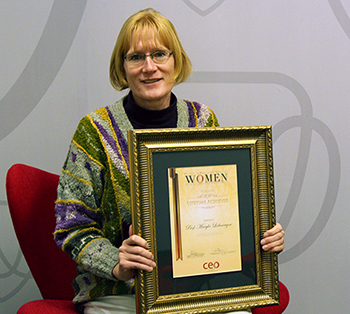Latest News Archive
Please select Category, Year, and then Month to display items
10 March 2022
|
Story Anthony Mthembu
|
Photo Unsplash
 The No Student Hungry team gearing up to start distributing food parcels to the selected students.
The No Student Hungry team gearing up to start distributing food parcels to the selected students.
The UFS is one of the many institutions of higher learning where food insecurity is an active issue. However, the
No Student Hungry Programme is one of the initiatives launched at the university to assist in fighting food insecurity at the institution.
The purpose of the programme
Since its inception in 2011, the initiative has assisted many students in acquiring a healthy meal. Additionally, the Food Environment Office also hands out food packages, so that students can continue to achieve academically. “We are trying to develop a healthy environment for students and make it easier for them to have a nice and healthy meal,” stated Annelize Visagie, who heads the Food Environment Office at the UFS. The Food Environment programme is spread out on all three campuses, each with its own facilitators. Furthermore, the programme mainly caters for students who are not funded by the National Student Financial Aid Scheme (NSFAS) but who are excelling academically. The abovementioned students apply for assistance online, and a list is then drawn up of students who receive assistance for the year.
Alternative solutions to keep the initiative running
On the Bloemfontein Campus, the No Student Hungry Programme will be catering for 200 students in the 2022 academic year, assisting them with a daily nutritious meal. Additional food parcels are also handed out to provide further assistance. “We give food parcels to the students on the list every Tuesday and Thursday at the Thakaneng Bridge,” Visagie highlighted. However, she argues that catering for the student population through this programme can be a challenge, as the demand for assistance is growing rapidly and the ability to assist is limited. The programme relies on partnerships and sponsors to assist the student body. In fact, the coordinators of the programme currently have a memorandum of understanding with Tiger Brands according to which they deliver around 100 food parcels for distribution.
In addition, the coordinators have put in place alternative measures to ensure that they can provide more food to students. “The
Kovsie Act Office, in partnership with the
Department of Sustainable Food Systems and Development, has started a food garden where healthy and nutritious produce are grown, in order to add value to the distribution,” she indicated. Although the programme can only assist to a point, students who are in desperate need of assistance are never turned away. In fact, the
Social Support Unit at Thakaneng Bridge usually assists students with food vouchers for a maximum of four days.
A commitment to teaching healthy eating habits
The programme is not only committed to curbing food insecurity, but also to ensuring that students have a healthy and balanced diet. As such, a booklet is being issued by the
Department of Nutrition and Dietetics in collaboration with the Department of Sustainable Food Systems and Development, which contains ways in which students can make a healthy meal using some of the ingredients offered in the food parcels.
“We want to teach students how to eat healthy in the cheapest way, because they don’t have a lot of money to buy expensive food products,” Visagie argued.
Researcher in Plant Breeding one of nine women on the African continent to receive acknowledgement for work in food security
2015-08-04

Prof Maryke Labuschagne |
Prof Maryke Labuschagne, Plant Breeding researcher in the Department of Plant Sciences at the University of the Free State (UFS), is one of only nine women on the African continent to receive the prestigious ‘Country Lifetime Achiever Award’ from Africa’s Most Influential Women in Business and Government Programme (MIW) this year.
During a breakfast event, CEO Communications recognised the Most Influential Women in SADC South who are Building Nations. The event took place at the Vodacom Dome in Midrand on 28 July 2015.
She received the award for her commitment and continuous contributions to food security. “I am concerned about this. We need to develop people who can go into Africa to work together for food security on the continent,” says Prof Labuschagne.
Prof Labuschagne and her students’ research focuses on the genetic improvement of food security crops in Africa, including such staples as maize and cassava. “These crops are genetically improved for yield, drought tolerance, disease, and insect resistance, as well nutritional value.”
“Food security is one of the key factors for stability and prosperity on the continent,” she says.
Apart from the fact that her research is helping to provide food for thousands of people on the continent, she is also an NRF-rated researcher, and author or co-author of over 160 articles in accredited journals.
This is not the firstaward that Prof Labuschagne has received for her work. In 2008, she was chosen as the National Agriculturalist of the Year by the Agricultural Writers Association of South Africa. In 2012, she received the Researcher of the Year award from Grain South Africa, as well as the African Union’s Kwame Nkrumah Science Award for Life Sciences on the continent.
The Country Lifetime Achiever Award is a prestigious award that recognises and honours the lifelong efforts, achievements, and contributions by individuals in their local communities. This recognition covers all sectors and countries, to create a platform where the work and involvement of extraordinary people can be displayed and noted.
About the award, Prof Labuschagne says: “It is always great to be recognised for your work.”
Elana Meyer (athlete) and Thuli Madonsela (Public Protector and advocate) have also received awards from the programme this year.